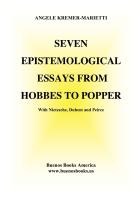About the Book
Seven Epistemological Essays From Hobbes to Popper, With Nietzsche, Duhem and Peirce,
By Angele Kremer-Marietti, Ph. D
In these seven essays, the French philosopher Angele Kremer-Marietti gives us a glimpse of her philosophy.
Her attention goes to the epistemological origin as a problem relative to any symbolicity.Trying to put the foundations of a theory of reasoning on the ground of philosophy as philosophy, she asks the fundamental question : what are meaning the presupposed terms of the philosophical research ?
With the intention of receiving words as simple symbolic items, she thinks that symbolization is the most important way of proceeding together as in natural language as in philosophy and science.
Author: Angèle Kremer-Marietti
Publisher: Buenos Books America

Buy Paperback on Amazon.com

ABOUT DR. ANGELE KREMER-MARIETTI,
French philosopher, has taught French Literature at Hollins College (Virginia) and the University of Saarbrücken (Saarland) and then in the philosophy and human sciences department at the University of Amiens in France.
She studied philosophy and anthropology in Paris, Tübingen, and Bonn, wrote extensively on metaphysics, philosophy of language, Rousseau, Hegel, Nietzsche, and on Michel Foucault and Jacques Lacan.
Preoccupied with method in a range of philosophical disciplines, she has done intensive research especially on the symbolic function with applications in political discourse, psychoanalysis, epistemology and published many books in France.
Testimonial:
We are fortunate in these pages to have seven essays by Angèle Kremer Marietti, best known in the English-speaking world as a distinguished interpreter of Comte and Nietzsche. The essays sample her vast work –forty books authored in forty years – over the entire history of modern philosophy.
To English readers probably the most striking feature of Marietti's work is her refusal to recognise a break between so-called 'analytic' and 'continental' traditions in philosophy. Her ability to see a continuous philosophical conversation across the traditions and centuries stems from her focus on science, and especially what could be called the 'positivist problematique'.
By this I mean the attempt to establish a formal language of thought and inquiry that enjoys the authority of metaphysics without incurring unjustifiable ontological commitments traditionally associated with that philosophical discipline. The focus thus turns to the construction and maintenance of rules of scientific conduct, otherwise known as methodology.
Steve Fuller
Professor of Sociology
University of Warwick
United Kingdom